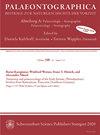匈牙利北部Felsőtárkány盆地中新世两栖动物和有鳞动物
IF 1.8
2区 地球科学
Q2 PALEONTOLOGY
Palaeontographica Abteilung A-Palaozoologie-Stratigraphie
Pub Date : 2013-10-14
DOI:10.1127/PALA/300/2013/117
引用次数: 35
摘要
在匈牙利北部Felsőtárkány盆地的7个地点,发现了至少38个无尾猿和鳞片类爬行动物类群,是迄今为止潘诺尼亚盆地中新世中晚期最丰富的爬虫动物群之一。在前潘诺尼亚海边缘沉积的化石组合具有较高的局部多样性,沉积环境多样。若干分类群的区系文献的组成(如:长耳鹬科)。(Salamandrina, saliturus f. marmoratus, Lissotriton, Ophisaurus, Pseudopus, ' Coluber ' pouchetii)在欧洲大陆中新世中期的分布明显更广泛。另一方面,一些新物种(如Parahynobius、Mertensiella cf. caucica、Albaneryx cf. volynicus、Natrix cf. rudabanyaensis、Hierophis cf. hungaricus、Vipera berus complex)与微型哺乳动物类似,表明来自亚洲大陆的动物影响被放大了。陆地蝾螈属Parahynobius(蝾螈科)的化石记录代表了其在欧洲的首次出现日期,而Mertensiella、Salamandrina、Chalcides、Albaneryx和Vipera berus复合体的化石记录则代表了其在潘诺尼亚盆地的首次出现日期。此外,来自非洲的石龙子Chalcides的存在表明这类蜥蜴的分化历史更早。基于某些无尾类和鳞片类类群共同出现的年平均降水量(MAP)表明,在阿斯塔拉纪/瓦利西亚界线上,年平均降水量呈上升趋势,这与基于大花群关联的估计有很大的相关性。本文章由计算机程序翻译,如有差异,请以英文原文为准。
Amphibians and Squamates from the Miocene of Felsőtárkány Basin, N-Hungary
Seven localities from the Felsőtárkány Basin, N-Hungary, yielded at least 38 lissamphibian and squamate reptile taxa and represents to date one of the richest herpetofaunas from the middle/late Miocene of the Pannonian basin. The fossil assemblages with relatively high local diversity were deposited near the margins of the former Pannonian Sea in a wide variety of sedimentary environments. The composition of the fauna documents for a number of taxa (e.g., Albanerpetontidae indet., Salamandrina, Triturus cf. marmoratus, Lissotriton, Ophisaurus, Pseudopus, ‘Coluber’ pouchetii) a distinctly wider distribution during the Middle Miocene of continental Europe. On the other hand, several newcomers indicate (e.g., Parahynobius, Mertensiella cf. caucasica, Albaneryx cf. volynicus, Natrix cf. rudabanyaensis, Hierophis cf. hungaricus, Vipera berus complex), similarly to micromammals, an amplified faunal influence from the Asiatic continent. The fossil record of the land salamander genus Parahynobius (Hynobiidae) represents its first appearance date (FAD) in Europe, whereas those of Mertensiella, Salamandrina, Chalcides, Albaneryx and Vipera berus complex is the FAD in the Pannonian basin. Furthermore, the presence of the African-derived skink Chalcides indicates an earlier divergence history for this group of lizards. The estimated mean annual precipitation (MAP), based on the co-occurrences of certain lissamphibian and squamate taxa indicates a rising tendency across the Astaracian/Vallesian boundary and largely correlates with the estimations based on macrofloral associations.
求助全文
通过发布文献求助,成功后即可免费获取论文全文。
去求助
来源期刊
CiteScore
3.80
自引率
3.70%
发文量
21
审稿时长
>12 weeks
期刊介绍:
Palaeontographica Section A publishes peer reviewed results of studies on palaeozoology, paleoecology and biostratigraphy. Its large paper format provides sufficient space for large tables, illustrations, photographs and Palaeontographica’s renowned plates.
Published contributions span all areas of palaeozoology, i.e., systematic, phylogenetic and ecological aspects. Careful peer review ensures the high quality of the papers, covering localities all over the world. Many landmark papers in palaeozoology and biostratigraphy were published in Section A of Palaeontographica. This includes numerous lavishly illustrated monographs of certain groups of fossils and stratigraphic ranges. These monographs, are typical for Paleontographica papers, characterised by numerous highest quality plates and are printed on special high quality paper for excellent reproduction of picture plates.

 求助内容:
求助内容: 应助结果提醒方式:
应助结果提醒方式:


